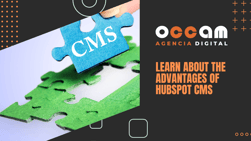Index Content
looking for the best way to achieve accuracy, efficiency and scalability in your business?
In a completely technological and automated world, companies have found it essential to find the necessary tools to keep control of all departments of their business. For example, when it comes to accounting and issuing invoices within your company, the best option is to get a complete electronic invoicing programme.
These programs take care of the tasks of accounting, issuing and receiving invoices, but leave aside other important areas of the business that should be equally or more attended to; such as marketing and sales.
However, one of the most advantageous features of these programmes is that they integrate with other programmes; thus obtaining a global vision of the business. And one of these integrations can be with HubSpot, which will not only offer you a complete vision of your business, but will also guarantee optimal results in your business strategies.
do you want to discover all the advantages of integrating HubSpot with your invoicing programme?
read on!
Key features of HubSpot
HubSpot CRM is a cloud-based platform with tools and integrations capable of carrying out multiple tasks for business growth. It assists marketing, sales, content management and customer service at all times, providing them with the best strategies and resources.
It has several tools: CMS Hub, Marketing Hub, Sales Hub, Services Hub and Operations Hub. You can work by integrating its hubs or with individual hubs, so the business flow becomes smoother with the help of these tools.
HubSpot launched its free CRM in 2014. Now it has become one of the best inbound marketing software. It has been adopted by more than 30,000 companies in around 90 countries. The features and benefits of HubSpot CRM have made this software one of the best in comparison to other CRM software in the market. It is especially targeted at startups, small and large companies that are in the process of growth
why do you need a CRM?
In a CRM, the entire management of customers, suppliers and almost all possible stakeholders of a business is set up in a structured overview and a staggering amount of data can be collected: notes, last communication, orders, statistics... All in one place, all tailored to design a successful relationship between the company and the customer.
CRM software not only helps to retain existing customers, but also to target new prospects, carry out quality management or proactively set up effective connections. We observe all too often that the use of a CRM is not exclusive to the sales team. Most of the time, a CRM is also valuable, at least in part, in other departments, and is used for data retrieval.
Reporting, data visualisation for an optimal overview, service and support, simplified collaboration and unique customer journeys can all be done with a CRM. And precisely because a CRM is often at the heart of many processes, integration with other applications plays a key role.
5 benefits of integrating HubSpot with your billing software
-
Forget about switching from one application to another
First and foremost, HubSpot integrations benefit your team by bringing all the functionality of two systems into a single solution. We've all experienced the frustration of switching back and forth between different applications while trying to complete a task. It's slow, tedious and inefficient. Being able to achieve most of your goals and accomplish most of your tasks through a single platform is much easier.
It's true that you can't do everything in HubSpot and you will have to make some changes, but having an integration will drastically reduce the time and number of times your team has to switch back and forth between applications.
While this may not seem like a big deal, HubSpot integrations streamline workflows in such a way that efficiency savings add up quickly. Working through a single platform but having access to the data contained in both systems means your team gets more done in less time.
-
All your information in one place
In complex B2B systems, there are often multiple sources of data. If those sources are not integrated, it is very easy for the information contained in each system to vary. When this happens, your team loses cohesion and pulls in different directions because they are basing their decisions on divergent data and evidence.
Similarly, isolated data sources are more likely to contain inaccuracies. This often happens because information is not automatically updated across the system. Instead, unreliable manual updates are needed to ensure that data is accurate across all platforms.
HubSpot's integrated systems provide a single source of information - and it's information that's based on real data and updated automatically, without the need for your team to constantly be manually reviewing every process in your business.
-
Facilitates growth
A simple integration is especially important if you're still growing or expect to expand your operations soon. As your business grows, you'll need additional tools and technologies to facilitate new operations and service your customers. If you have to create time-consuming custom integrations for each of those tools, you won't be able to scale at optimal speed.
-
More informed decision-making
When it comes down to it, the more information you have at your disposal, the better equipped you are to make decisions based on real data. In the age of big data, businesses can no longer rely solely on instinct, tradition or experience. Everything must be backed by data.
HubSpot integrations allow you to make decisions based on real information by bringing all your data together and giving you greater depth of analysis. You can combine information from your CRM, CMS and ERP, creating a much more rounded picture of how your customers behave, how best to reach them and how to keep them loyal once they buy your products.
-
An omni-channel data infrastructure
Finally, integration with HubSpot contributes to the development of modern omni-channel business systems, and this has wide-ranging implications for your business and the customer experience you deliver.
The omni-channel approach emphasises the elimination of data silos and aims to create a system where customers, data and employees can move seamlessly between systems and channels.
For example, a shopper may initiate an enquiry via the website chatbot and then switch to a live agent. In an omni-channel system, this change is seamless for the customer because there is no obstacle preventing them from jumping from one channel to another. But it is also seamless because the conversation they had with the chatbot (and the information it contains) is available to the human agent they speak to next. They do not have to repeat the conversation or re-enter the information.
The omni-channel approach is the future. B2B organisations need to make sure they are building connections that facilitate this multi-channel movement. Integration with HubSpot is a great way to break down silos and work towards a fully omni-channel system.
want to integrate HubSpot with your billing software?
Occam walks you through this process.
After understanding all the benefits that a simple and easy integration with HubSpot can bring to your business, the question is no longer if you are going to integrate, but when and how.
Don't worry about these last two questions, because you can leave everything in our hands and Occam will be happy to help you.





